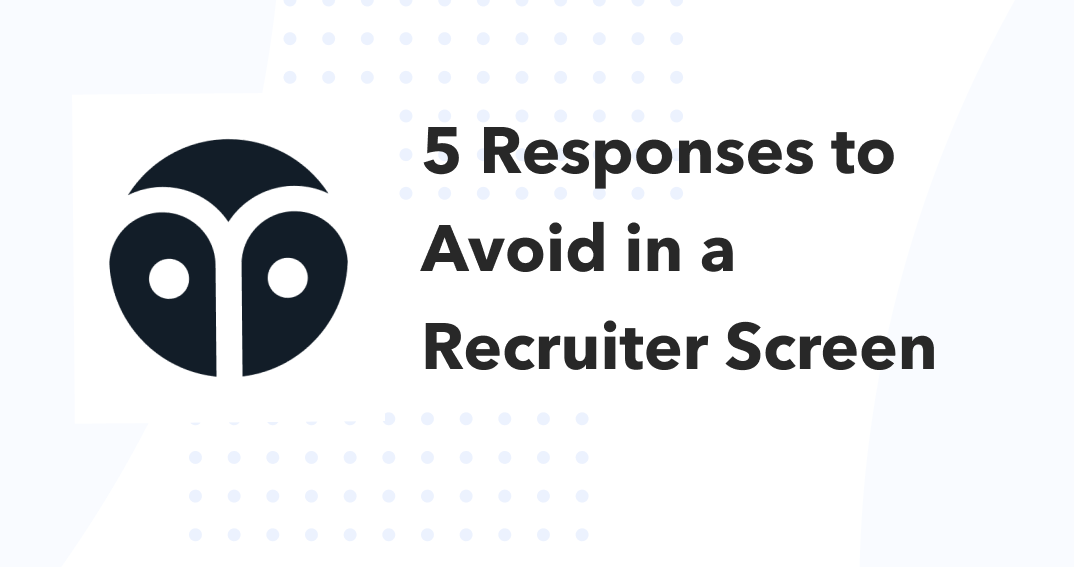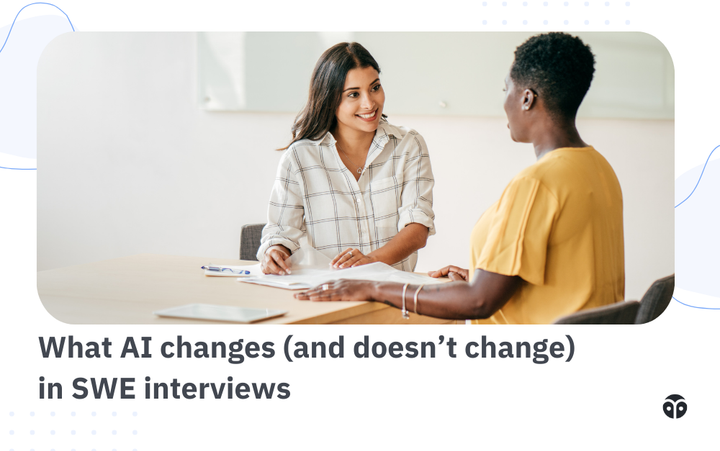5 responses to avoid when a recruiter asks, “What are you looking for in your next role?”
Learn how to respond (and not respond) during a recruiter screen for a software engineer job when asked, "What are you looking for in your next role?"

Recruiter screens for software engineers are usually the first step in the hiring process. They generally assess candidates' basic qualifications, skills, and cultural fit for a specific role.
The questions in recruiter screens can cover technical skills, behavioral scenarios, and discussions about past experiences. To make it through the screen and into the next round, you want to demonstrate a strong fit with the company culture and effectively communicate your experiences and motivations for applying for that specific role.
In this series, we’ll take a look at some common recruiter screen questions and how to answer them, starting with “What are you looking for in your next role?”
The question: “What are you looking for in your next role?”
When recruiters throw this classic question your way, they're digging into your motivations, values, and where you see your career heading.
Essentially, they want to know if your goals align with what their company has to offer in terms of culture and values. It’s not as simple as it sounds. To ace this question, you have to show that you're intentional about your job hunt, but also flexible.
How do you walk that line?
To make a positive impression, you should come across as thoughtful, intentional, and flexible. Crafting a response that balances independence with a desire for collaboration and growth can leave recruiters with a favorable impression of your fit for the role and the organization.
Let’s dive into five common mistakes software engineers make when answering this question—and what to say instead.
Mistake #1: Highlighting mentorship as a main focus
Saying something like, "I’m seeking a company with a robust mentorship program," might raise red flags.
As companies grow, they typically enlist senior engineers to guide mid-level engineers, who guide their junior counterparts. Regardless of an engineer’s level, companies need engineers who are resourceful and independent. When someone voices that they want 'mentorship,' it causes concern because it sounds like the person is asking explicitly for intense hand-holding.
Saying, “I want a role with mentorship," can lead to an instant rejection.
Companies who are filling junior or early-career roles usually have mentoring support in place, but they want to bring on junior employees who have confidence in their ability to succeed without relying on those resources. Expressing an overt preference for mentorship could be misinterpreted as a desire for intensive hand-holding, potentially leading to swift rejection.
What to say instead: Instead of making mentorship the focal point, underscore your independence and self-reliance. Consider saying something like, "I’m a self-sufficient engineer, and I’m eager to join a team of outstanding professionals who can support me in my continued growth."
A response like this showcases your confidence in working autonomously while expressing openness to collaboration, and you strike a balance that resonates positively with potential employers.
Mistake #2: Being negative about your current or previous employer
There are many reasons why your current role might not be a good fit. That’s a reality we all face. But it’s not a good idea to bring those reasons up in an interview. Providing negative reasons for leaving, like being burnt out, overworked, or suffering in a toxic culture, raises major red flags for recruiters.
Companies only want to hire the best of the best. A potential employer doesn’t want to bring on an employee who’s running away from their current situation, no matter how bad it may be. You need to communicate that you’re looking forward—focused on meeting future goals—not running away from something that’s hard. Speaking negatively about current or past situations also raises the potential for more questions. It’s natural for the recruiter to wonder if it was really a you issue rather than a company issue.
It’s much more enticing for them to bring on someone who is already working well in their current role and has future-focused goals that are making them look for something new.
What to say instead: Rather than dwelling on the negatives, direct the conversation toward your future goals. Consider a response like, "I’m on the lookout for a role where the team's directives align with the company goals. I want to contribute to a team with a clear vision and the chance to make a meaningful impact." This way, you're positioning yourself as someone looking ahead, ready to tackle new challenges, and aligning your goals with the company's objectives.
Mistake #3: Prioritizing non-work-focused aspects of the company/role, like work-life balance or compensation
When you say something like, "I’m looking to join a company where there is great work-life balance," it could be perceived as prioritizing personal benefits over contributing to the company's success. Companies want to hire individuals who are passionate about the work itself and the impact they can make.
Focusing on something like work-life balance or compensation may lead the company to believe that you are more interested in how the company benefits you rather than how your work can contribute to the company's success. This focus on personal benefits over professional contributions might not resonate well with recruiters.
What to say instead: Shift the emphasis to your dedication and contribution. For instance, try saying, "I’m looking to join a company that values its employees and recognizes great work. I believe in contributing to a positive work environment and making a meaningful impact through my skills and dedication." This way, you align your goals with the organization's objectives, showing a balance between personal and professional priorities.
Mistake #4: Wanting to learn new tech for your own benefit
It’s great that you’re interested in learning. And there’s a place for personal development in your role. But in a recruiter screen, when you say something like, "I saw you guys work in Rust. I really want to learn Rust, so I thought it would be a great fit," it may send the message that your primary goal is personal skill development rather than contributing effectively to the company's objectives.
Sure, companies want engineers who are eager to learn, but their main objective is to have contributors who can make an immediate impact with minimal ramp-up time. Focusing on personal growth areas could lead the company to question whether you’ll be a strong contributor without requiring significant additional training. Companies prioritize candidates who bring skills that align with the role and can contribute effectively from day one.
What to say instead: Align your learning goals with immediate contributions. Consider saying, "I noticed your stack aligns well with my skillset; I work mostly in JavaScript, so I felt I would be able to make an immediate impact on Frontend feature work. I also researched and discovered a few engineers are working in Rust. If there’s a culture of contributing to other teams, I would love to get involved and learn a bit about the language." This response demonstrates your eagerness to contribute immediately while expressing a genuine interest in expanding your skillset in a way that aligns with the company's needs.
Mistake #5: Being a big fan of the company
This one may be surprising. When you say something like, "I’ve always wanted to work at [Dream Company]. They are my dream company," it may come across as too eager and raise doubts about your ability to critically evaluate the fit between your skills and the actual role.
Companies appreciate candidates who are genuinely interested. They also want assurance that you’re considering the specifics of the job and can be honest about it being a good fit. Recruiters can worry that you’ll overlook certain aspects of the role that aren’t a good fit or even fabricate a bit just to land a role at your dream company.
What to say instead: Maintain a balanced and neutral tone. For example, try saying, "I’ve heard some great things about working at [Company]. I am curious to learn more about what kinds of unique challenges they face and how I can contribute to solutions." This way, you express interest without appearing overly eager, leaving room for a more nuanced conversation about how your skills align with the company's needs. It positions you as genuinely interested while allowing for a more thoughtful exploration of the role and its challenges.
Interested in more support?
All Formation Fellows receive one-to-one sessions and feedback from technical recruiters. If you’re having trouble debugging your job search on your own, apply here and get unconditional support from a team of engineering mentors, technical recruiters, career coaches, and more.



